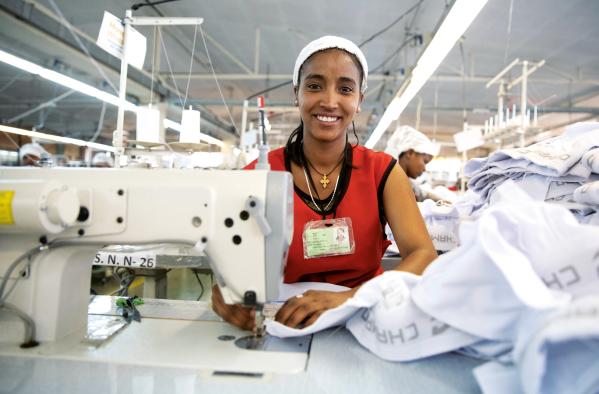Commitment to fair and free global trade

Germany is an export Export Germany is one of the leading export nations. In 2022 it exported goods and services valued at some 1,576 billion Euros. The balance of foreign trade fort he year posted a surplus of 81 billion Euros. Germany has above all the strong performance of its industry to thank for its strength in exports… Read more › -focused nation with a strong network of partners around the world. The Federal Government Federal Government The Federal Government and cabinet is made up of the Federal Chancellor and the Federal Ministers. While the Chancellor holds the power to issue directives, the ministers have departmental powers, meaning that they independently run their respective ministries in the framework of those directives… Read more › campaigns for open markets, and free and fair trade based on clear and robust regulations. Along with promoting multilateral trade liberalisation, supporting the European Union European Union In 1957, Germany was one of the six founding members of today’s EU, along with France, Italy, Belgium, the Netherlands and Luxembourg. The EU is currently made up of 27 states; the euro is the official currency in 20 of them. For Germany, European integration forms the basis for peace, security and… Read more › free trade agreement is also a priority. German economic diplomacy rests on key three pillars: 225 foreign diplomatic missions, the offices of more than 140 chambers of commerce abroad (AHK), delegations and representations of German business in 93 countries, and the Germany Trade and Invest (GTAI) economic development agency of the Federal Republic of Germany. They provide targeted support to help German SMEs SMEs The German economy is characterized first and foremost by small and medium-sized enterprises as well as the self-employed and the independent professions. Some 99.4 percent of all companies are small and medium-sized enterprises. These are firms with annual sales of below EUR 50 million and a… Read more › gain a foothold in foreign markets.
Championing free trade
Germany is closely involved in shaping how international trade is regulated. In addition to multilateral trade liberalisation under the aegis of the World Trade Organization ( WTO WTO The World Trade Organization (WTO) was founded in 1995 and serves to implement the existing treaties on international trade. It is likewise a forum for negotiation on liberalizing global trade. In the present Doha round Germany has been expressly championing better integration of the developing… Read more › ), bilateral free trade agreements (FTA) through the European Union European Union In 1957, Germany was one of the six founding members of today’s EU, along with France, Italy, Belgium, the Netherlands and Luxembourg. The EU is currently made up of 27 states; the euro is the official currency in 20 of them. For Germany, European integration forms the basis for peace, security and… Read more › are a priority for Germany. The EU has already concluded around a dozen FTAs with partners, with plans to reach FTAs with many other countries. The EU-Japan Agreement came into force in 2019, creating the world’s largest economic area. Other examples include the EU-Canada Comprehensive Economic and Trade Agreement (CETA) and the EU-Vietnam FTA. Efforts are being made to conclude an FTA between the EU and the Association of Southeast Asian Nations (ASEAN).
Business and human rights
German trade policy places a particular emphasis on compliance with human rights Human rights The respect and strengthening of human rights worldwide are a cornerstone of German Federal Government policy. Together with its EU partners it is committed to protecting and continually advancing human rights standards throughout the world. This occurs in close collaboration with the institutions… Read more › standards and promoting human rights. At the end of 2016, the German government adopted its National Action Plan “Implementation of the UN Guiding Principles on Business and Human Rights Human rights The respect and strengthening of human rights worldwide are a cornerstone of German Federal Government policy. Together with its EU partners it is committed to protecting and continually advancing human rights standards throughout the world. This occurs in close collaboration with the institutions… Read more › ” (NAP). It is based on the UN Guiding Principles on Business and Human Rights, which were adopted in 2011. Through a set of uniform and verifiable standards, the NAP imposes a responsibility on German businesses to uphold human rights along their global supply chains. Sector-specific dialogues and initiatives have been developed to help implement the NAP. The automotive industry dialogues, for example, involves businesses, associations and civil society groups, and has proposed wide-ranging recommendations to implement the UN Guiding Principles. Another forum is the Textile Partnership, where the Federal Government Federal Government The Federal Government and cabinet is made up of the Federal Chancellor and the Federal Ministers. While the Chancellor holds the power to issue directives, the ministers have departmental powers, meaning that they independently run their respective ministries in the framework of those directives… Read more › works with NGOs, businesses and trade associations to develop standards for a social, ecological and corruption-free textile and clothing industry.
Promoting sustainable supply chains
Working in partnership with international organisations such as the EU, the UN, the International Labour Organisation (ILO), the OECD, as well as multilateral forums such as G7, G20 and the Asia-Europe Meeting (ASEM), the Federal Government Federal Government The Federal Government and cabinet is made up of the Federal Chancellor and the Federal Ministers. While the Chancellor holds the power to issue directives, the ministers have departmental powers, meaning that they independently run their respective ministries in the framework of those directives… Read more › is campaigning for a level playing field and sustainable supply chains. It is paying particular attention to the responsibility that German businesses have for their supply chains. In 2019, the Federal Government developed legislation that requires businesses to identify and combat human rights Human rights The respect and strengthening of human rights worldwide are a cornerstone of German Federal Government policy. Together with its EU partners it is committed to protecting and continually advancing human rights standards throughout the world. This occurs in close collaboration with the institutions… Read more › risks in their supply chains. Under the LkSG law, businesses are also required to help victims of human rights violations access compensation. The law applies to businesses based in Germany as well as the offices and branches of foreign businesses with at least 1,000 employees. It came into force at the beginning of 2024. It also makes businesses responsible for safety at work, adequate pay, the right to join a trades union, preventing child and forced labour, protecting the rights of indigenous people and protecting the environment at every stage of the supply chain.
The Federal Government is also campaigning for the creation of European duty of care regulations. These would include duties to protect the environment and climate, in addition to protecting human rights.


